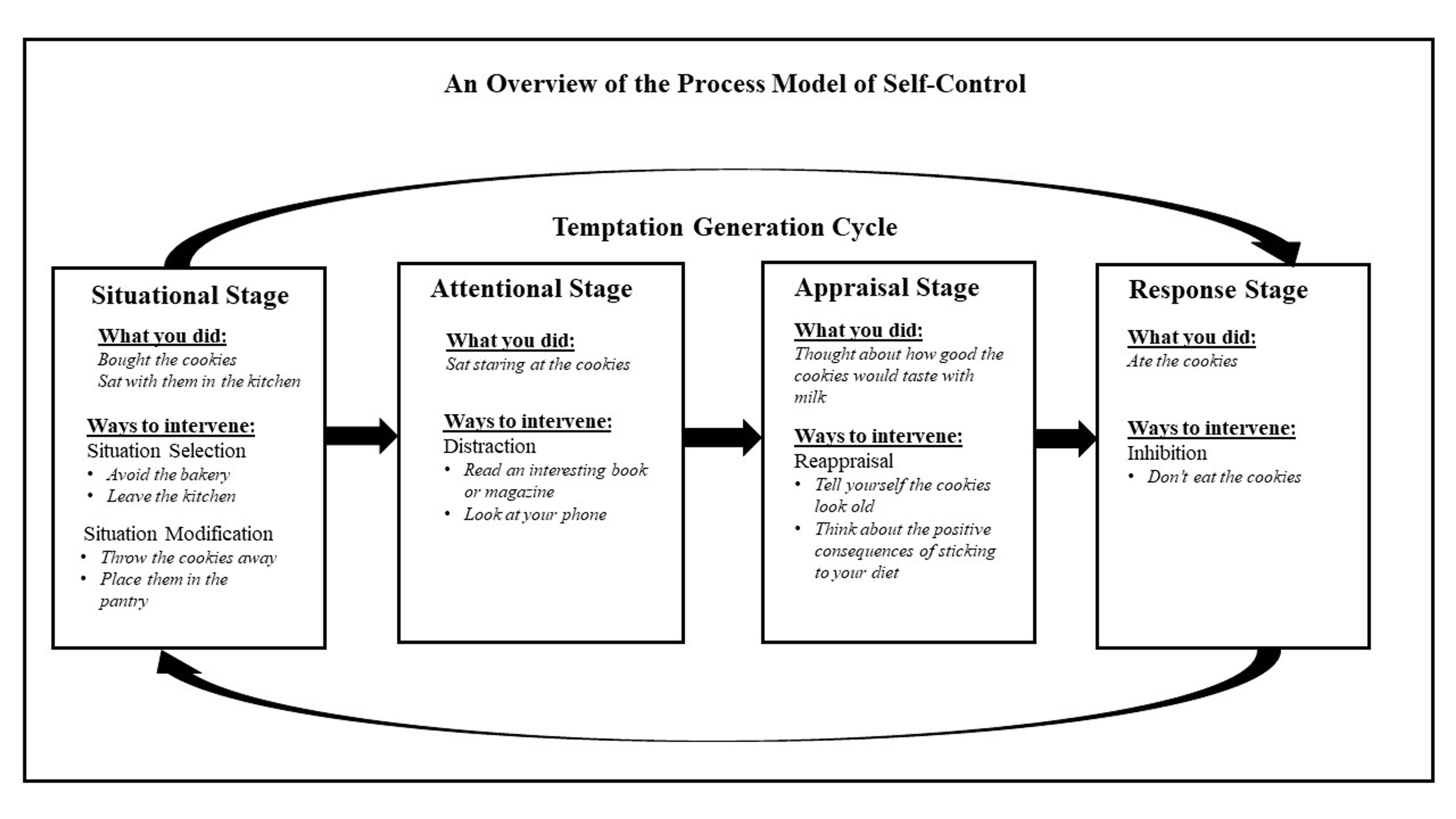You’ve had a long week but fortunately it’s Friday and things are looking up. After grinding through the day, you stop on the way home to buy groceries for dinner. After getting the necessities, you decide on impulse to buy a dozen cookies. You’re on a diet, but you reassure yourself that you’ll eat only one, two at most, to celebrate the arrival of the weekend. Once home, you enjoy your celebratory cookies as planned. Two are enough, but despite your best efforts you continue eyeballing those remaining cookies. Wouldn’t they go great with milk? Maybe just one more with a glass? Before you know it, you’ve polished off a dozen cookies and several glasses of milk, and you’re cursing your poor self-control.
Look on the bright side, at least it was fat-free milk. Also, you’re not alone. Research that prompted people to record what’s happening multiple times a day found that self-control failures are a frequent and common occurrence of everyday life. Whether it’s pizza, beer or doing anything but exercising, we all have our vices, and many of us would like to have better self-control. But what is self-control exactly? A working definition is that it’s the ability to do what’s in your best interests in the long run – such as managing your weight – over what’s enjoyable right now – such as gorging on cookies.
In 2007, the American psychologist Roy Baumeister put forward what has become the most influential psychological model of self-control. His strength model likens willpower to a muscle. If you start doing pushups, you’ll feel only a minor burn. But keep it up, and that minor burn will grow into a full-blown conflagration, at which point you won’t be able to keep going. Baumeister suggested that the same thing happens when you use self-control. If you overwork your self-control muscle, you’ll eventually run out of willpower, and lose the ability to exert self-control.
The success of Baumeister’s book Willpower: Rediscovering the Greatest Human Strength (2012), co-authored with John Tierney, suggests that the strength model resonates with many people. As a doctoral student studying self-control, I can understand why. The model eloquently explains many of our most vexing self-control failures. In the cookie example, the tumultuous week, capped off by an agonising day, sapped your willpower, leaving you unable to resist those cookies. Additionally, it conforms to our commonsense beliefs about self-control. After all, everyone knows that self-control is hard and, more often than not, we need herculean willpower to overcome temptation.
Your heroic efforts are likely to leave you looking more like Sisyphus than Hercules
If the strength model is correct, what does this mean for improving your self-control? Applying the muscle analogy, one possibility might be to strengthen your ‘self-control muscle’. Researchers have tested this by asking people to do things such as brush their teeth with their nondominant hand for two weeks. Such exercises are quite challenging because they force you to curtail deeply ingrained habits using ‘inhibitory self-control’. But does self-control training actually work? According to a 2017 meta-analysis of many relevant studies, self-control training seems to be effective at improving ‘self-control stamina’ – the ability to exert inhibitory self-control for longer periods.
So, is that the solution to greater self-discipline? Exercise your self-control muscle and get better at inhibitory self-control?
Unfortunately, it’s not so simple. You might have noticed how I switched back and forth between ‘inhibitory self-control’ and the broader concept of ‘self-control’, but the two are not synonymous. Though boosting your inhibitory self-control or ‘willpower’ might sound appealing – perhaps you imagined yourself using inhibitory self-control to force yourself not to eat the cookies, just like you would if you forced yourself to brush with the opposite hand – it’s not clear that inhibitory self-control actually works this way in everyday life.
Take the findings from a 2017 study that involved volunteers recording their daily experiences of temptation for a week. The individuals who experienced more temptation were less likely to achieve their long-term goals, even if they also reported using more inhibitory self-control. This suggests that using inhibitory self-control to resist those cookies might help you in the moment, but not in the long run. So even if you use inhibitory training (eg, the teeth-brushing challenge) to build a brawny self-control muscle, your heroic efforts are likely to leave you looking more like Sisyphus than Hercules.
Research in my own lab and others suggests that, if you want to improve your self-control, what you should do instead is focus on proactively reducing, rather than reactively overpowering temptation. Fortunately, there are several ways and opportunities to do this.
Before getting to the specifics, it helps to think in terms of a model that the American psychologist Angela Duckworth and her colleagues proposed – ‘the process model of self-control’. It organises self-control strategies according to when they’re initiated in the ‘temptation generation cycle’. This cycle describes the stages we must go through before we get to the point where we actually act upon a temptation – see the figure below.
For example, to gorge on those cookies at the end of your working week, you first had to go through a situational stage, where you put yourself in a compromising situation with tempting cookies. From there, you transitioned to an attentional stage, where you directed your attention back towards those cookies. After that, you went through an appraisal stage, where you thought about how good those cookies would taste (especially with a glass of milk). All this led to a response stage, where you broke down and eventually ate all the cookies. To put it bluntly, a lot of things had to go wrong for you to end up giving in to temptation. The good news is that this means you could have applied self-control at several instances prior to when you tried and failed to exert inhibitory self-control (or ‘willpower’ in everyday talk).

Figure supplied by the author
Let’s start with the situational stage. You don’t need to be well-versed in social psychology to recognise the power of the situation. Most teachers will tell you it’s easier for students to focus when they sit in the front of the classroom. With this in mind, you could have employed what Duckworth’s team call ‘situational self-control strategies’. For instance, instead of sitting in front of a box of cookies and forcing yourself not to eat them, you could have either not bought them in the first place – known as ‘situation selection’ – or simply removed them from sight by placing them in a cabinet (or thrown them out) – ‘situation modification’.
Prior research suggests that these situational strategies are quite effective. For example, one study that instructed high-school students to use situational strategies (such as removing buzzing cellphones and other temptations from sight) found that they made more progress towards their academic goals, compared with others who were simply instructed to use inhibitory self-control. Similarly, dieting research suggests that a simple yet overlooked way to lose weight is to avoid situations where tempting, high-calorie foods are readily available. For example, when you go grocery shopping, plan to avoid walking through the bakery. That way, you are less likely to encounter cues (pleasant smells and sights) that strengthen temptation. Think ‘out of sight, out of mind’.
It’s time to stop lamenting your poor self-control and accept that you have a weak self-control muscle
But what if you can’t use situational strategies? After all, you might have no choice but to walk through the bakery, or perhaps you’ll upset your kids if you throw away the cookies. Thankfully, there are other ‘psychological strategies’, initiated during the attentional and appraisal stages, that can be useful when the situation is uncontrollable.
Some clues come from Walter Mischel’s classic ‘marshmallow test’ that involved children attempting to resist a single beckoning marshmallow for 15 minutes, for the reward of two if they were successful. Among other crucial variables, Mischel and his collaborators, including the American psychologist Ozlem Ayduk, suggested that one reason some kids were so good at resisting temptation was their ability to use ‘cooling strategies’. For instance, research in Mischel’s lab found that children would wait longer if they distracted themselves by simply turning away from the marshmallow. He also found that they could wait longer if he taught them to ‘reappraise’ the temptation by thinking of the marshmallows as ‘puffy round clouds’.
Importantly, these strategies work for adults too. In a series of studies I conducted with Ben Wilkowski at the University of Wyoming, we found that the use of distraction (for instance, directing attention away from the temptation to go out by focusing on work that’s particularly interesting) and reappraisal (reminding oneself there will be many opportunities to go out, but only one opportunity to take the upcoming exam), along with the situational strategies discussed earlier, consistently helped college students make progress towards their long-term goals. So, it might be useful to direct your attention away from the cookies by simply picking up a book or reframing the cookies in a way that makes them seem less desirable. You know, from where I’m sitting, the cookies look kind of old.
Taken altogether, the message from the latest research on willpower is that it’s time to stop lamenting your poor self-control and accept that you have a weak self-control muscle. It might be fun to change things up while you brush your teeth but, remember, building your self-control muscle probably won’t help you achieve your long-term goals. Why drive a stone up a hill when you know it’s going to tumble down the other side? Unless you’re cursed by the gods, there’s no reason to do this – you’re not Sisyphus. Instead of brute strength, be strategic; you might find that it’s much easier to achieve your goals.








